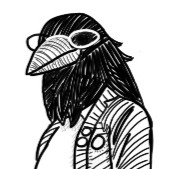absence of evidemce adolescence aesthetic ai paranoia alan rickman animal crossing animal crossing new horizons bots cliches david bowie dead internet theory death egoizing environment family generations Greek myth hades ii holiday cards and other such things hometown imperial radch liminal loss music odysseus odyssey rambling-ass nonsense re: pictures of kitties relationships retro retro-futuristic science fiction Star Trek stephen fry suika game suika game planet technology telemachus ten years time Ursula K. Le Guin watercolor ways of being seen ways of seeing writing
Eighth grade I had to take a computer basics class, which consisted of things like: how to open Microsoft Word. For some reason we had a visitor come speak to the class about life in his country. I forgot the country. But I do remember my mind being blown when he said that in his culture, birthdays were no cause for celebration, because they meant you were one year closer to death.
I was only a few years into that developmental stage wherein your neural architecture is setting up to understand ambiguities, innuendo, plasticity of cultural norms–even the norms you think are so basic to human nature you are baffled they can be seen another way (i.e. birthdays are good.) I had a vague idea that space aliens would have radically different norms, but the idea that humans, on Earth, could have norms that different was a revelation. I wish I had taken that moment to read more anthropology and speculative fiction, but I had no interest in what I saw as issues that, in the grand scheme of things, don’t Mean Anything, like politics. It took me a while to realize that those tedious concrete issues do effect material conditions and therefore are of relevance–if not to me, to others–but at the time I was engulfed in fantasy, in narrative and character and magic and arcane knowledge. The things that matter. Anime, video games, books, making up stories.
Anyway, where I was going with this — I read Demian around this age and it absolutely blew my mind inside-out. I thought it was the deepest most true shit in the entire universe. And I realize that age at which I read it is one of the key reasons it is a favorite book; the things you are obsessed with in those early myelinating ages, 11-14 or so, stick with you, become integrated into your scaffolding. I’ve recommended it over the years to people of a progressively older age, pacing with my own age, and they did not see the brilliance I did. I recently re-read it (well into my 30s) and to me it now holds up as one of those books that articulates truths that you already know but did not have the words to express. So it now comes to me as a time-travel piece, a window back into my thinking as an adolescent, and in that, there is brilliance, the clarity with which those childish thought processes were recorded.
I still love a good bildungsroman. But instead of guiding me through my own awakening, it is a bittersweet, nostalgic transcendence, wherein I see all the more clearly all the years of my life superimposed over each other to make one “self”.
Maybe the other utility of the bildungsroman to the grown self (other than nostalgia and the revelation evoked from that itself, a chain of realizing-that-realizing-that-realizing in the context of an entire life) is in reminding us what it was like to be that age, and in giving us some grace when dealing with adolescents up their own ass enamored with their own brilliance.
(Forefront of things I was obsessed with during that ‘building of self’ age was Revolutionary Girl Utena and Neon Genesis Evangelion; you tell me what that says about me.)

Leave a Reply